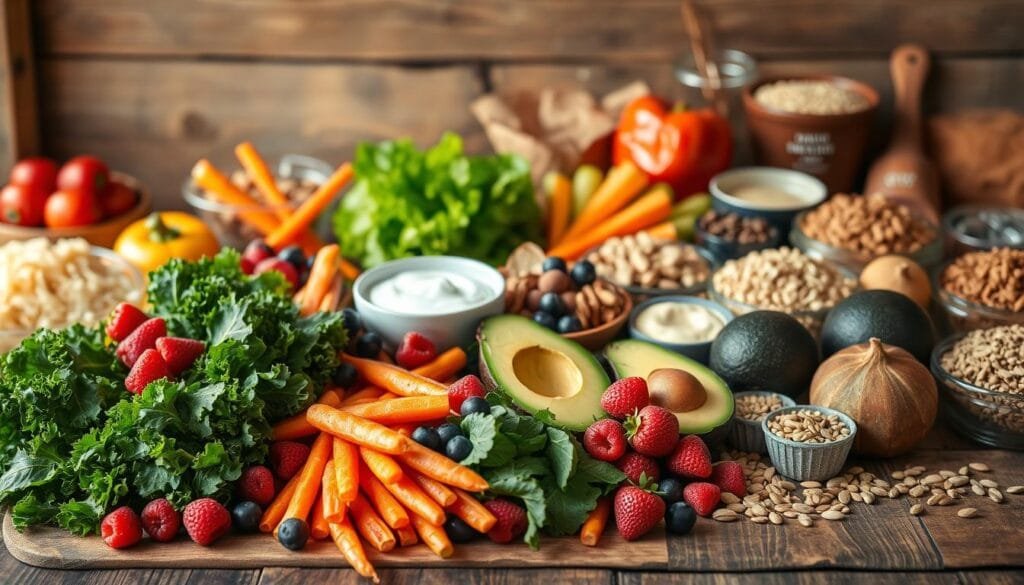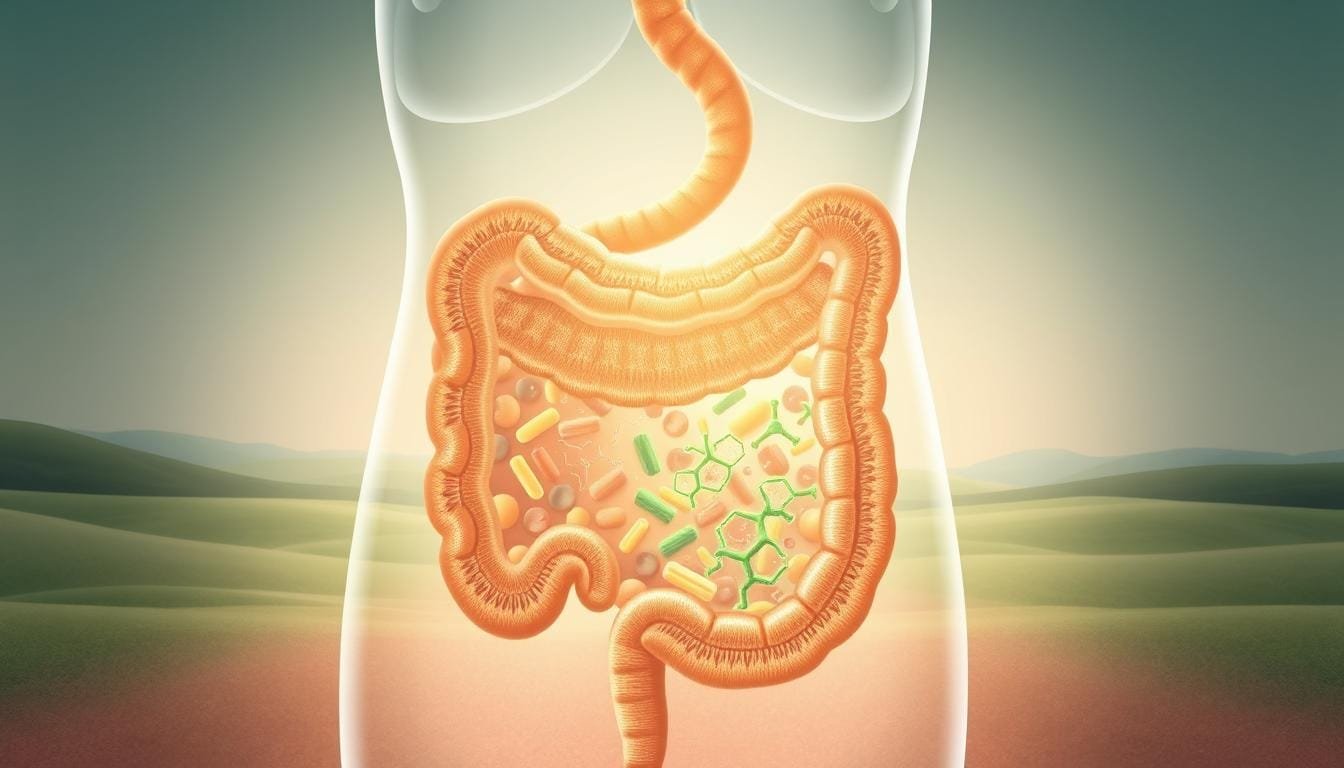Currently Empty: RM0.00
Ever wondered why some people stay energized while others struggle with fatigue and bloating? The answer often lies in the gut. Trillions of microorganisms, known as the gut microbiome, play a crucial role in digestion, immunity, and overall health. When harmful bacteria dominate, it can lead to discomfort and long-term health issues.
Balancing gut flora doesn’t require extreme measures. Simple dietary adjustments, probiotics, and lifestyle changes can help restore harmony. Wellness Concept specializes in personalized gut health solutions, guiding clients toward sustainable well-being. Their experts offer tailored advice to reset gut flora efficiently.
For those seeking quick results, the body can naturally rebalance within days with the right approach. Need professional guidance? Contact Wellness Concept via WhatsApp at +60123822655 during business hours for a consultation.
Key Takeaways
- The gut microbiome impacts digestion, immunity, and overall wellness.
- Harmful bacteria can cause discomfort and long-term health problems.
- Dietary changes and probiotics help restore gut balance naturally.
- Wellness Concept provides expert guidance for personalized gut health.
- Quick results are possible with the right approach.
Understanding Your Gut Microbiome
The gut microbiome is like a bustling city inside your body, home to trillions of tiny residents. These microbes—bacteria, fungi, and viruses—form a complex ecosystem that influences everything from digestion to mood.
What Is the Gut Microbiome?
This inner community aids digestion, breaks down food, and extracts nutrients. It also produces vitamins like B12 and K, crucial for energy and blood health. Studies from UNC and Stanford show its remarkable adaptability to diet and lifestyle changes.
Why Is Gut Health Important?
A balanced microbiome supports the immune system and reduces inflammation. When harmful bacteria gut dominate, risks for obesity, diabetes, and even mental health issues rise. Health experts link imbalances to leaky gut and chronic diseases.
Like a clock, the microbiome follows a circadian rhythm. Poor sleep or stress disrupts this rhythm, weakening its defenses. For personalized advice, explore probiotics to nurture beneficial microbes.
Signs of an Unhealthy Gut
Your body often sends clear signals when gut health is out of balance. Ignoring these signs can lead to chronic conditions or worsen existing ones. Early detection helps restore harmony faster.
Common Symptoms of Gut Imbalance
Physical and mental clues often point to microbiome issues. Watch for:
- Digestive distress: Bloating, gas, or alternating diarrhea/constipation.
- Skin reactions: Eczema or acne linked to inflammation.
- Fatigue: Persistent tiredness despite adequate sleep.
- Mood swings: Anxiety or brain fog tied to gut-brain axis disruptions.
How to Assess Your Gut Health
Tracking patterns helps identify triggers. Try these methods:
- Diet journals: Note food reactions over 2–4 weeks.
- Elimination diets: Temporarily remove gluten, dairy, or processed sugars.
- Stool tests: Analyze microbial diversity with professional kits.
“Trust your gut when it feels off—subtle changes often matter most.”
Stress and poor sleep skew results, so assess during stable periods. For personalized insights, consult a gut health specialist.
The Role of Diet in Gut Health
Diet plays a starring role in maintaining or disrupting gut harmony. Every bite either feeds beneficial microbes or fuels harmful ones. Research shows that Western diets reduce Bifidobacterium, while Mediterranean diets boost Lactobacillus.

Foods That Harm Your Gut
Some foods create an imbalance, allowing harmful bacteria to thrive. Limit or avoid these culprits:
- Refined carbs: White bread and pastries spike blood sugar, starving good bacteria.
- Added sugars: Soda and candy feed inflammation-linked microbes.
- Processed meats: Preservatives like nitrates damage gut lining.
Foods That Promote Good Bacteria
Other foods act as fuel for a thriving microbiome. Prioritize these:
- Polyphenol-rich foods: Berries, dark chocolate, and olive oil reduce inflammation.
- Fermented foods: Yogurt and kimchi deliver live probiotics.
- High-fiber options: Asparagus and lentils feed microbes with prebiotics.
| Harmful Foods | Beneficial Foods |
|---|---|
| Processed meats | Fermented foods (kefir, sauerkraut) |
| Sugary snacks | Leafy greens |
| Alcohol (except red wine) | Whole grains (oats, quinoa) |
“A 2019 study found the Mediterranean diet increased microbial diversity by 30% in just 8 weeks.”
Small swaps—like choosing whole grains over white rice—add up. For personalized diet plans, consult a gut health specialist.
How Do You Flush Bad Bacteria from Your Gut?
Restoring gut harmony involves a blend of diet, movement, and mindful habits. A targeted 3-day reset plan can kickstart microbial balance while long-term consistency ensures lasting results.
Step-by-Step Guide to Restoring Gut Balance
Day 1 focuses on dietary shifts. Swap processed foods for Mediterranean staples like olive oil and leafy greens. Reduce alcohol and aim for 30 minutes of movement.
Day 2 prioritizes prebiotics. Add flaxseeds or roasted broccoli to meals. Fermented drinks like kombucha introduce live cultures.
Day 3 emphasizes hydration and stress relief. Opt for plant-based meals and herbal teas. Practices like deep breathing support microbial diversity.
| Day | Focus | Action Items |
|---|---|---|
| 1 | Diet Shift | Mediterranean meals, exercise, no alcohol |
| 2 | Prebiotics | Flaxseeds, kombucha, fiber-rich veggies |
| 3 | Hydration & Stress | Meatless meals, herbal teas, mindfulness |
The Power of Probiotics and Prebiotics
A thriving gut relies on two powerful allies: probiotics and prebiotics. While probiotics introduce live microbes, prebiotics act as their fuel. Together, they create an environment where good bacteria dominate.
Best Probiotic Sources
Not all fermented foods are equal. Seek these potent probiotic sources:
- Unsweetened yogurt: Contains Lactobacillus strains for digestion.
- Miso paste: A fermented soybean staple in Asian cuisines.
- Sauerkraut: Raw versions (not pasteurized) retain live cultures.
Prebiotic Foods to Feed Good Bacteria
Prebiotics are indigestible fibers that nourish Bifidobacteria. Top choices include:
- Jerusalem artichokes: Packed with inulin, a premier prebiotic.
- Garlic and onions: Boost microbial diversity naturally.
- Green bananas: Resistant starch fuels gut lining repair.
Even red wine (in moderation) helps—its polyphenols promote beneficial gut microbiota. Pair these with probiotics for a synergistic effect.
“Think of probiotics as seeds and prebiotics as fertilizer—both are essential for a flourishing gut garden.”
Lifestyle Changes for a Healthier Gut
Daily habits shape gut health as much as diet—stress, movement, and sleep play pivotal roles. Tiny tweaks to routines can rebalance microbes faster than drastic diets.

The Impact of Stress on Gut Health
Cortisol, the stress hormone, weakens the gut lining and fuels harmful bacteria. This imbalance (dysbiosis) links to bloating, fatigue, and mood swings.
Combat stress with:
- Mindfulness practices: Just 10 minutes of daily meditation lowers inflammation markers.
- Yoga: Twists and deep breathing stimulate digestion and reduce cortisol.
- Nature walks: Exposure to green spaces boosts microbial diversity.
Exercise and Sleep for Gut Balance
Movement isn’t just for muscles—it’s a microbiome booster. A 2021 review found athletes host 40% more beneficial bacteria than sedentary individuals.
Prioritize these health benefits:
- Moderate exercise: Brisk walking or cycling 30 minutes daily enhances anti-inflammatory microbes.
- 7–8 hours of sleep: Gut microbes follow circadian rhythms; poor rest disrupts their cycles.
- No late-night meals: Eating past 8 PM slows digestion and alters microbiome activity.
“Think of your gut as a nightshift worker—it repairs best when you’re asleep.”
Small lifestyle shifts compound over time. Pair them with probiotic-rich foods for a thriving gut ecosystem.
Expert Tips from Wellness Concept
Navigating gut health can feel overwhelming, but expert guidance simplifies the journey. Wellness Concept combines cutting-edge science with personalized care to address unique microbiome needs. Their team deciphers complex health signals, turning confusion into actionable steps.
Personalized Gut Health Advice
No two guts are alike. Wellness Concept crafts plans based on stool tests, food intolerances, and lifestyle. Clients receive:
- Tailored diets: Fermented foods for some, low-FODMAP plans for others.
- Targeted supplements: Like BLIS K12® for immune-gut synergy.
- Progress tracking: Adjustments based on symptom changes over 4–8 weeks.
“Our clients often see bloating reduce by 50% within a month of customized protocols.”
When to Seek Professional Help
While diet tweaks help, some conditions demand a doctor’s insight. Red flags include:
- Blood in stool or unexplained weight loss.
- Chronic pain unrelieved by dietary changes.
- Recurring fatigue despite probiotics and sleep improvements.
Wellness Concept offers WhatsApp consultations (+60123822655, Mon–Sun) for urgent concerns. Their success stories include clients reversing IBS symptoms through personalized protocols.
Common Myths About Gut Health
From juice cleanses to miracle supplements, gut health myths often overshadow science-backed solutions. Misguided trends promise rapid fixes, but research reveals lasting balance requires patience and smart choices.
Debunking Detox and Cleanse Myths
Many believe extreme detox programs flush harmful bacteria. Yet, a 2023 Gut Microbiome Journal study found no evidence that juice cleanses alter microbial diversity long-term. Instead, they risk:
- Nutrient deficiencies: Prolonged fasting deprives good bacteria of prebiotic fibers.
- Rebound imbalances: Harmful microbes rebound faster post-cleanse.
The Truth About Quick Fixes
Three-day resets may offer temporary relief, but the microbiome resists abrupt changes. For sustained benefits, prioritize:
| Quick Fixes | Sustainable Habits |
|---|---|
| Juice cleanses | Daily fiber-rich diets |
| Detox teas | Herbal teas (ginger, peppermint) |
| Supplement overload | Targeted probiotics (e.g., BLIS K12®) |
“The Mediterranean diet increased beneficial bacteria by 40% in 12 weeks—outperforming every cleanse we tested.”
Small swaps, like olive oil over processed fats, yield compounding gut health rewards. For myth-free guidance, consult experts who prioritize evidence over trends.
Conclusion
A resilient gut thrives on simple, daily habits, not quick fixes. Prioritize diverse gut health foods, stress management, and quality probiotics to support beneficial bacteria.
Skip extreme cleanses—consistency beats shortcuts. For tailored plans, Wellness Concept crafts personalized strategies. Reach them via WhatsApp at +60123822655 (Mon–Sun).
Your gut anchors overall health. Nurture it with mindful lifestyle choices, and the rewards will follow.
FAQ
What is the gut microbiome?
The gut microbiome consists of trillions of microorganisms, including bacteria, fungi, and viruses, living in the digestive tract. These microbes play a key role in digestion, immunity, and overall health.
Why is gut health important?
A balanced gut supports digestion, nutrient absorption, immune function, and even mental health. An unhealthy gut can lead to bloating, fatigue, and chronic conditions.
What are common signs of an unhealthy gut?
Frequent bloating, gas, diarrhea, constipation, food intolerances, and unexplained fatigue may indicate gut imbalance. Skin issues like eczema can also be linked to poor gut health.
Which foods harm gut bacteria?
Processed foods, refined sugars, artificial sweeteners, and excessive alcohol can disrupt gut balance. Fried foods and high-fat diets may also promote harmful bacteria growth.
What foods promote good gut bacteria?
Fermented foods like yogurt, kefir, sauerkraut, and kimchi are rich in probiotics. High-fiber foods such as bananas, oats, and asparagus feed beneficial bacteria.
How can probiotics help restore gut balance?
Probiotics introduce live beneficial bacteria into the gut, aiding digestion and reducing harmful microbes. Sources include supplements and fermented foods like miso and kombucha.
Does stress affect gut health?
Yes, chronic stress disrupts gut bacteria and increases inflammation. Practices like meditation, deep breathing, and regular exercise can help manage stress levels.
When should someone see a doctor for gut issues?
Persistent symptoms like severe bloating, blood in stool, or sudden weight loss require medical attention. A healthcare provider can diagnose underlying conditions like IBS or SIBO.
Are gut cleanses effective for removing bad bacteria?
Most cleanses lack scientific backing and can harm gut balance. A fiber-rich diet, hydration, and probiotics are safer ways to support microbial health.



